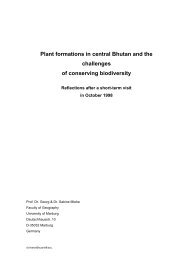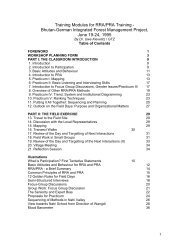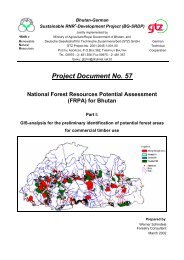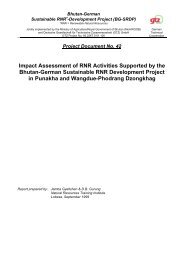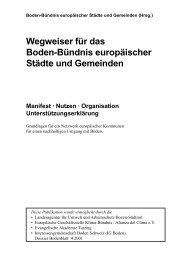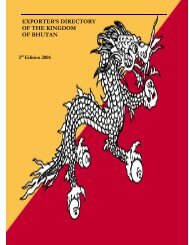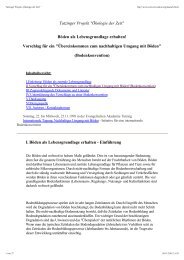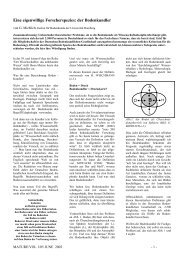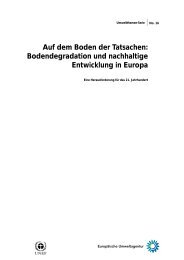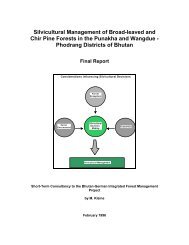<strong>Nahi</strong> Approach Road of Hope RRA <strong>Survey</strong> May 2001prevent inappropriate focus. The objective should not be to produce good Rapid Appraisal reports, butrather to do a good Rapid Appraisals that will produce informati<strong>on</strong> for better decisi<strong>on</strong>s.Development tourismBiases: roadside bias, - project bias, bias of pers<strong>on</strong>al c<strong>on</strong>tacts, - dry seas<strong>on</strong> bias, - bias of politeness andprotocolToo much attenti<strong>on</strong> to observed things and activities, but not enough to the relati<strong>on</strong>ships, (seeing theindebtedness but failing to see the relati<strong>on</strong>ship of interest rates, wages, patr<strong>on</strong> client relati<strong>on</strong>s, etc.)Failure to recognize that what is seen is a “snapshot”, a moment in time and not trends that may bemore significant;Failure to recognize gaps left by disciplines, which are not represented am<strong>on</strong>g the team and the lessobvious gaps which lie between the disciplines themselves and their traditi<strong>on</strong>al territories and c<strong>on</strong>cerns.<strong>Baseline</strong> studiesSince Rapid Appraisal collects limited quantifiable data, and since the sample size is an opportunitysample, purposely chosen and not a random sample, its future use for project is limited. Even though itis a mistake think Rapid Appraisal can replace a baseline survey, the Rapid Appraisal provides animportant first step for c<strong>on</strong>sidering the difficult questi<strong>on</strong>s of evaluati<strong>on</strong> <strong>on</strong> impacts, trends andcausality.Checklists and c<strong>on</strong>fidence in the data producedFlexibility in adapting Rapid appraisal to specific study needs and available resources is the mostimportant strength of the methodology. The same flexibility that is so critical to making the studyrelevant to the local situati<strong>on</strong>, when abused permits individuals to do anything, <strong>on</strong> almost nothing, andcall it “Rapid appraisal”. The lack of agreement <strong>on</strong> what c<strong>on</strong>stitutes Rapid Appraisal and the lack ofdiscussi<strong>on</strong> <strong>on</strong> methodology in most rapid Appraisal reports make it difficult to estimate the degree ofc<strong>on</strong>fidence that can be placed in the data. (H<strong>on</strong>adle).Group Exercises carried out during the training include;C<strong>on</strong>ducti<strong>on</strong> and preparati<strong>on</strong> of transects mapsVillage and Resource mappingsExecuti<strong>on</strong> of Group and individual interviews am<strong>on</strong>g participants and later with farmersPair-wise bean and wealth rankingSeas<strong>on</strong>al calendar and historical transect interviewxxiv
<strong>Nahi</strong> Approach Road of Hope RRA <strong>Survey</strong> May 2001WHY RRA AND PRAINTRODUCTIONThe earlier RRA was more extractive. Professi<strong>on</strong>als go to the rural areas and obtained data from them,brought away and processed it, more or less to see what we thought would be good for them. RRA stillremains valid and useful. But now in additi<strong>on</strong> more and more practiti<strong>on</strong>ers are adopting participatoryapproaches as learners, c<strong>on</strong>veners, catalysts, and facilitators. In PRA mode, we enable rural people todo their own investigati<strong>on</strong>s to share their knowledge and teach us to do the analysis and presentati<strong>on</strong>sto plan and to own the outcome. PRA has been described as a growing family of approaches andmethods to enable local people to share, enhance and analyse their knowledge of life and c<strong>on</strong>diti<strong>on</strong>s, toplan and to act.In PRA the key is pers<strong>on</strong>al behaviour and attitudes. This includes critical self awareness and embracingerror, sitting down, listening and learning, not lecturing but handing over the stick to villagers, whobecome the main teachers and analysts; having c<strong>on</strong>fidence that they can do it; and an open-endedinventiveness.Why Rapid Rural Appraisal (RRA) Originally in the Late 1970s and 1980s?Need: accelerating rural change, and the need for good and timely informati<strong>on</strong> and insights.Recognising “us” and our c<strong>on</strong>fidence in our knowledge as much of the problem, and “them” and theirknowledge as much of the soluti<strong>on</strong>.Rural development tourism – anti-poverty biases (spatial, project, pers<strong>on</strong>, seas<strong>on</strong>al,) and being rapidand wr<strong>on</strong>g.<strong>Survey</strong> slavery – questi<strong>on</strong>naire surveys which take l<strong>on</strong>g, mislead, are wasteful, and are reported <strong>on</strong>, ifat all, late.The search for cost-effectiveness, recognising trade-offs between depth, breadth, accuracy, andtimeliness, assessing actual beneficial use of informati<strong>on</strong> against costs of obtaining it.Why Also PRA <str<strong>on</strong>g>No</str<strong>on</strong>g>w?A c<strong>on</strong>fluence of approaches and methods –applied social anthropology, RRA, agro ecosystem analysis,farming system research, participatory acti<strong>on</strong> research.The discovery that “they can do it” (mapping, diagramming, analysis,)The relative power and popularity of the open against the closed, the visuals against the verbal, groupagainst individual analysis, and comparing against measuring.The research for practical approaches and methods for decentralisati<strong>on</strong>, democracy, diversity,sustainability. Community participati<strong>on</strong>, empowerment…Principles Shared by RRA and PRARapid progressive learning – flexible, exploratory, interactive, and inventive.Reversals – learning from, with and by rural people, eliciting, understanding and appreciatingITK(indigenous technical knowledge).Optimal ignorance and appropriate imprecisi<strong>on</strong> – not finding out more than is needed, not measuringmore accurately than needed, and not trying to measure what does not need to be measured. We aretrained to make absolute measurements, but often trends, scores or ranking are all that are required.Triangulati<strong>on</strong> – using different methods, sources and disciplines, and a range o fin formants in a rangeof places, and crosschecking to get closer to the truth through successive approximati<strong>on</strong>s.Principle investigati<strong>on</strong>s direct c<strong>on</strong>tact – face to face in the field.Seeking diversity and differencesTHE CORE OF PRAPRA as it is evolving, is all this and more. Some of the “more” isFacilitating – they do it: empowering and enabling villages to do more or all the investigati<strong>on</strong>,mapping, modelling, diagramming, ranking, scoring, quantificati<strong>on</strong>, analysts, presentati<strong>on</strong>, planning…themselves and to share and own the outcome. Analysis by them, shared with us.Our behaviour and attitudes - for this, the primary of our behaviour and attitudes, and of rapport, moreimportant than methods, -- asking villagers to teach us respect for them, c<strong>on</strong>fidence that they can do it,handing over the stick.A culture of sharing – of informati<strong>on</strong> of methods, of food, of field experiences (between NGOs,Government and villagers).Critical self-awareness about our attitudes and behaviour, doubt; embracing and learning from error;c<strong>on</strong>tinuously trying to do better, building learning and improvement into every experience.xxv



